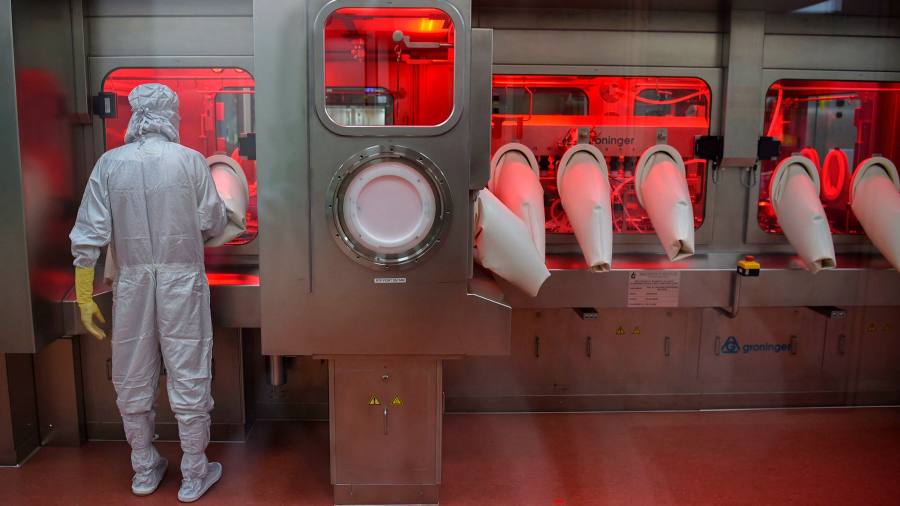Two of India’s leading vaccine manufacturers, which produce injections AstraZeneca and Johnson & Johnson, have warned that global vaccine production is being threatened by America’s pandemic export controls.
Mahima Datla, chief executive of pharmaceutical company Biological E, said American suppliers say they may not be able to fulfill orders from global customers because of Washington’s use of the Defense Production Act.
Calling for urgent international intervention, Datla told the Financial Times: “Not only will this make it difficult to scale up Covid’s vaccines, but because of that, it will make routine vaccine manufacturing extremely difficult.”
Both U.S. President Joe Biden and his predecessor Donald Trump invoked the Korean war-era DPA during the pandemic to ensure priority supplies of materials needed to control the disease. But with the United States ordering more than enough doses for every adult in the United States, American suppliers are struggling to do enough to fulfill contracts outside the country.
The White House did not immediately respond to a request for comment, but a spokesman said last week: “The president is deeply focused on the issue of expanding global vaccination, manufacturing and delivery, which will be critical to ending the pandemic.”
Mahima Datla, chief executive of Biological E, called for urgent international intervention to resolve the vaccine supply problem © Noah Seelam / AFP via Getty Images
Pharmaceuticals around the world are struggling to increase production, as countries make accusations of “vaccine nationalism”. Last week, European Council President Charles Michel said the United Kingdom had banned the export of vaccines, a claim denounced by the Boris Johnson government. The EU urged the US to allow the free flow of drug supplies to deal with vaccine shortages.
The White House said in response that it was “in close contact with the EU regarding our common vaccine concerns”.
On Friday, Tedros Adhanom Ghebreyesus, director general of the World Health Organization, also warned of the global shortage of vital components, which were limiting the production of Covid-19 vaccines, but also of jabs used for childhood immunizations routine. He said that some countries had imposed legal restrictions, which was “putting lives at risk” and called on nations not to stock up on supplies. “We are all interdependent,” he said. “No country can just vaccinate to get out of this.”
Datla, whose company is making the Johnson & Johnson vaccine, said the DPA means that suppliers are “reluctant to commit to meeting their delivery deadlines”.
“Supply chain challenges will make expansion extremely difficult.”
Materials that are a crucial part of vaccine production include plastics, such as disposable fermenters and bags made by a limited number of companies. Some vaccine manufacturers are days away from stopping production because of the lack of these large sterile coatings. The supply of laboratory reagents, used for chemical tests, was also a concern, she added.
Biological E, a family-owned pharmaceutical company based in Hyderabad, supplies vaccines to WHO and Unicef for distribution worldwide.
It is developing a Covid-19 vaccine in partnership with the North American pharmaceutical company Dynavax Technologies Corporation and Baylor College of Medicine, with the goal of producing 1 billion doses. The company is also making at least 1 billion doses of the Johnson & Johnson vaccine by the end of 2022.
Datla’s comments came after Adar Poonawalla, chief executive of the world’s largest vaccine manufacturer, Serum Institute of India, warned that the Defense Production Act could undermine the global vaccination effort.
“The Novavax vaccine, of which we are a major manufacturer, needs these items from the United States,” said Poonawalla. “We are talking about having free global access to vaccines, but if we cannot get the raw materials out of the US – that will be a serious limiting factor.”
Datla said she was hopeful that after a meeting on Friday between the Quad – a diplomatic and security initiative between the United States, Japan, India and Australia – the supply situation could be resolved.
The United States is working with Quad to curb China’s growing presence in the region and hopes to combat Beijing’s growing dominance with vaccine diplomacy.
Additional reporting by Hannah Kuchler in New York and Kiran Stacey in Washington

